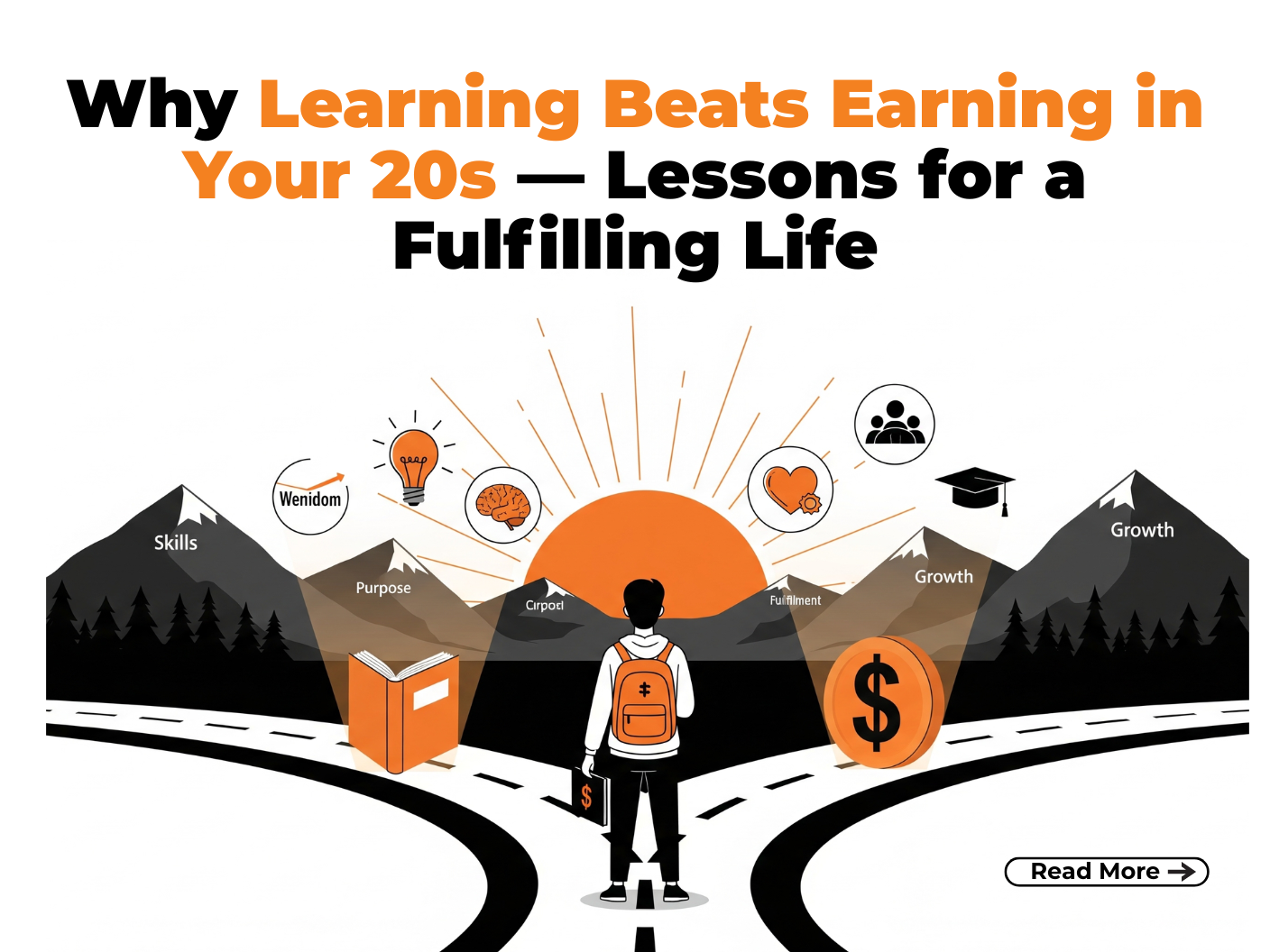In a world driven by the race for success, instant gratification, and the constant pursuit of financial gain, it’s easy to believe that your 20s should be all about making money. But understanding the difference between learning vs earning early on can shift your entire journey, because building a strong foundation in 20s leads to success that’s not just profitable, but also purposeful.
Let’s explore this in depth.
- Your 20s Are Your Foundation Years
Imagine trying to build a skyscraper on a weak foundation — it won’t stand the test of time. The same logic applies to your career. Your 20s are not meant to be the peak of your success; they are the years where you lay the groundwork.
This is the time to absorb knowledge, understand how industries work, and develop your personal and professional discipline. It’s less about the immediate rewards and more about preparing yourself to succeed in your next phase of life and beyond. Think of it as the stage where you are assembling your toolbox — the skills, mindset, and character that will serve you for life.
- Don’t Focus on Making Money Right Away
This may sound counterintuitive, especially in a world where side hustles, social media influencers, and tech startup millionaires in their 20s grab headlines. But these are exceptions, not the rule.
Chasing money in your 20s often leads people into roles that offer short-term gain but little long-term value. You may find yourself stuck in repetitive, shallow jobs that offer few learning opportunities and little growth. Instead of asking, “How much will I make?” ask, “What will I learn?”
This is where skills over salary matters most, the knowledge and abilities you gain now will shape your career far more than a paycheck.
Money will come — but wisdom, resilience, and competence take time to build. Those are the real assets that compound over time.
- Choose a Job Where You Can Learn
When evaluating job opportunities, look beyond the salary and title. Ask yourself:
Will this job expose me to new skills?
Will I be working with experienced professionals who can teach me?
Is there room for mentorship?
Will I be challenged to grow?
Jobs that put you in a position to solve real problems, communicate across teams, think critically, and adapt to new tools or systems are far more valuable in the long term. Don’t underestimate entry-level roles or small companies — they often offer hands-on experience and close mentorship that large corporations may not.
- Be Less Concerned with the Name of the Company, More With the Mentor and Skills
In your 20s, brand names don’t matter as much as the people you work with and the skills you pick up. Many young professionals get dazzled by big names like Google, Apple, or McKinsey. While those companies are excellent in their own right, they are not automatically the best places for everyone to learn.
What really matters is who you work under. A good boss can accelerate your growth, challenge your thinking, and help you avoid costly mistakes. A mentor who believes in your potential and invests time in your development is worth more than a flashy company name on your résumé.
A small or mid-sized firm with a strong learning culture and access to decision-making processes can teach you far more about real-world business than a narrow role in a corporate giant.
- Learn How to Work in a Team and Understand Business Functions
No matter where your career takes you — whether it’s corporate, entrepreneurship, or the non-profit sector — your ability to collaborate, communicate, and coordinate with others will determine much of your success.
Use your 20s to:
Understand how different departments like marketing, sales, finance, HR, and operations come together to deliver value.
Learn how to listen, manage conflict, give and receive feedback, and support others’ success.
Watch how senior leaders make decisions, lead teams, and navigate challenges.
Business is not just about knowledge — it’s about people. Your ability to work well in a team, manage relationships, and lead others will set you apart in your next phase of life.
- Embrace Failure and Learn from It
Another reason not to chase money too early: it makes you fear failure. Your 20s should be a time to experiment, take risks, and sometimes fail — because you can recover quickly and grow from it.
Failure in your 20s is not a step back — it’s a launchpad. Every mistake becomes a lesson, and every lesson is a building block. When your focus is on learning, you’ll see every experience, good or bad, as part of your journey forward.
Invest in Yourself Before Anything Else
Jack Ma’s advice isn’t about slowing down your ambition — it’s about redirecting your focus. Rather than seeing your 20s as a time to accumulate wealth, see it as a time to accumulate value: in your skills, your thinking, your network, and your work ethic.
Your 20s are a time for self-development in youth, investing in yourself early brings returns that no bank can match.
So, if you’re in your 20s:
Don’t obsess over your salary.
Choose roles that challenge and teach you.
Find a boss who pushes you to grow.
Be humble enough to learn and brave enough to fail.
Build the foundation of a fulfilling, resilient career.
Because in the long run, those who learn early are the ones who earn big — not just in money, but in life. And it’s often those who choose fulfillment vs financial success and embrace a career growth mindset in their 20s who go on to become the true leaders, innovators, and changemakers of tomorrow.














